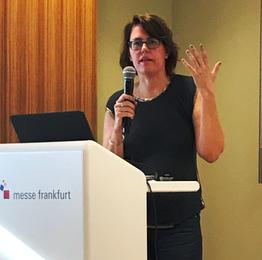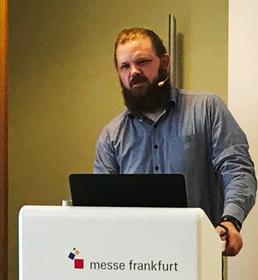 For the second consecutive year, booksellers and bookseller association heads from around the world gathered at the Frankfurt Book Fair for a meeting of the European and International Booksellers Federation. Speakers shared best practices and insights into book markets as varied as the United Kingdom, Germany, the United States and even the Faroe Islands.
For the second consecutive year, booksellers and bookseller association heads from around the world gathered at the Frankfurt Book Fair for a meeting of the European and International Booksellers Federation. Speakers shared best practices and insights into book markets as varied as the United Kingdom, Germany, the United States and even the Faroe Islands.

|
|
|
Susanne König |
|
During her keynote presentation, Susanne König, executive director of powerHouse and powerHouse on 8th in Brooklyn, N.Y.--and the recipient of the first Frankfurt Buchmesse U.S. Booksellers Prize from Frankfurt Book Fair New York (formerly the German Book Office)--related that 30%-50% of sales during a typical evening event are not actually tied to that event. She explained that people come in, have fun and browse around, and if drinks are served, the "money flows a little easier." She added that a two-hour event in the evening often accounts for around 50% of a single day's sales volume, and if she closed her stores at 6 p.m. or 7 p.m. she "wouldn't be able to survive."
When asked if there had ever been any disasters in terms of organizing and running events, König replied that publicists sometimes insist on having ticketed events, but will decide to cancel the event after disappointing ticket sales rather than go back to their client and "say no one wants to see you."
Pierre Coursières, chief executive of the French bookstore chain Le Furet du Nord and a board member of France's Syndicat des distributeurs de loisirs culturels, said that the best thing his bookshop did last year was create "Le Cercle des Lecteurs," which Coursières translated as the "club of readers." Similar in concept to a teen advisory council but open to adults, the "club of readers" consists of 20 passionate customers who help review and recommend upcoming titles for Furet du Nord in exchange for galleys and ARCs. The store has also organized a fiction award, selected by the club of readers, and is planning awards for comics, nonfiction and other genres.
Coursières said that the 20 members were "mostly women of all ages" and "crazy of reading," adding that he was "amazed" by the quality of their contributions: "their expertise was at the best level." One of the club members, he related, was even chosen to be a jury member for a French literary prize.
At the bookstore Rit & Rák on the Faroe Islands, owner Kári Árting created a book prize for a Faroese-language novel. Árting explained that though 200-250 books are published in Faroese every year, he has often found himself or his booksellers asking publishers for a "book that doesn't exist." In the lead-up to the country's annual literary festival in 2014, Árting wanted a contemporary Faroese novel about identity and decided to do it himself rather than go to a publisher. At the end of the festival, Rit & Rák launched a competition for a contemporary novel set in the Faroes that came with a prize of 50,000 Danish krone (a little less than $8,000) and a publishing contract with a leading publisher. The contest's winner, Árting said, was published last year.
During his presentation, Árting said that Rit & Rák accounts for about 50% of the market on the Faroe Islands, and when asked how he achieved this, Árting said that it was because he stays extremely local and focuses on the Faroese language and culture. Before he opened his store, he recalled, the main bookstore "had Danish books in front." When Árting started, he "put Faroese books in front."

|
|
| Daniel Lager | |
Daniel Lager, co-owner of the bookstores Bücherstube Fuhlsbüttel and Bücherstube am Krohnstieg in Germany, recalled that while Bücherstube am Krohnstieg, which opened near Hamburg in May 2016, was being built, the windows to the bookstore were never blocked and the door was always open. Curious residents could take a look at what was going on in the space, even come inside and ask questions over tea and coffee. Lager explained that he felt people were naturally curious and it would be "very wrong" to not "serve that curiosity." He also suggested: "If you do anything in your shop, don't hide it. Be open about it." People will want to know what's going on, and you could very well be the "talk of the town."
Lager said that perhaps the best thing he did in terms of organizing the store was not using fixed labels for bookshelves and bookstore sections. Rather, Lager installed blackboards on the walls above the shelves, and the labels for sections are written in chalk by hand. The system allows for flexibility in rearranging the store and trying new arrangements. Lager remarked that though his store does not sell tea or coffee, he and his employees will sometimes offer a beverage to a customer in order to "make them stay longer." He doesn't advertise this, though, because then people will simply take the drink to go.
Jane Streeter, owner of the Bookcase in Lowdham, England, and former president of the Booksellers Association of the U.K. & Ireland, discussed her store's annual Brilliant Book Award. Created in 2007, the award sees local schoolchildren between the ages of 11 and 13 vote for their favorite book of the year. The process begins in November, with a small committee of school librarians selecting a shortlist of six age-appropriate titles. Schools then order those books from the Bookcase at a 20% discount and organize reading groups for the award throughout the winter and spring. In March, the students vote for the winner, and they also design the award's logo.
Streeter reported that publishers and authors "really love this award" and that it has "such positive outcomes" for all schools involved. And while the Bookcase does see a nice commercial benefit for a relatively small project, Streeter said that the real advantage is how the award has "raised our profile considerably among schools" in the region. Relationships with publishers, she added, have also been "greatly enhanced."
 |
|
| Sveinung Ramunda | |
Norwegian bookseller Sveinung Råmundal outlined some of the political efforts of the Norwegian Booksellers Association, of which he is a board member. Most recently, the NBA has helped secure a "prolonged exemption" for fixed book prices from new laws meant to further liberalize Norway's economy. Råmundal explained that while many in Norway's government prefer a free market, Norway's parliament wanted to keep fixed book prices. He said he thinks Norway will keep fixed prices in the future and that he hopes to get a "book law" protecting it. Last year, Norway also launched a support scheme meant to promote bookshops as social and cultural spaces for building community. Norwegian booksellers can apply for grants of up to €5,000 (about $5,910) for bookstore projects that will be "good for the local community."
Alexander S. Belenky, researcher and member of the city of Moscow-owned bookstore Moscow Book House, was on hand to speak about the Association of Book Distributors of Independent States, a booksellers association covering countries that were once part of the Soviet Union. Belenky reported that during the Soviet era, bookstores were supported by the state and paid no rent and no more than half of the utility fees. But since the dissolution of the Soviet Union, bookstores have lost government support, with many politicians believing that the digitalization of bookselling is inevitable and that bookstores no longer have a place in society. The ABDIS is attempting to get the Russian government to support and protect books and literature in the same way it supports and protects other cultural activities including music, theater, cinematography and visual arts.
In Australia, what was once called National Bookshop Day has been transformed into Love Your Bookshop Day, Australian Booksellers Association chief executive Joel Becker reported. The old National Bookshop Day, he explained, had begun to be regarded as an "institutional celebration of bookselling," and has now been turned into an Australia-wide celebration about loving your bookshop and a call to action for shopping local and independent. Held on the second Saturday in August, the new and improved Bookshop Day saw most participating stores experience growth of at least 25% over that same Saturday the year before.
And last but not least, Mats Ahlström, owner of Djursholms Bokhandel in Sweden and president of the Swedish Booksellers Association, discussed Swedish Books Sales, a program started in 2012 to collect sales data from Swedish bookstores. Ahlström called SBS a "goldmine" of useful information, and said that the SBA applied and received a grant of €100,000 (about $118,215) to develop the program. Among the goals for the program are including data from book subscription services such as Storytel and Bookbeat, which currently operate only in Sweden but Ahlström said would soon spread across Europe the way Spotify once did, and increasing the monitored market share to 85% of bookstores. --Alex Mutter

